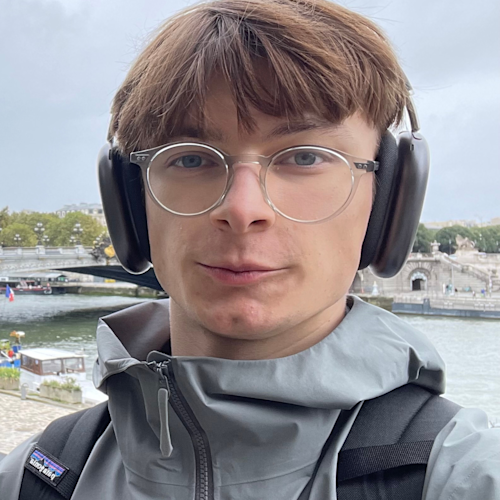Tom Smail, 21

Tom Smail: The Dyslexic Tinkerer Who Turns Hackathons into Family
“Being dyslexic, I’ve always found creative problem‑solving more intuitive than traditional learning,” admits Tom Smail, a Computing undergraduate at Imperial College London. That unconventional mindset first ignited when teenage Tom built gaming PCs for his friends, discovering a whole system he could pull apart and reassemble. Code followed close behind. “Programming is both my craft and my passion,” he says, crediting late‑night experiments with Python 3.10 and GitHub Copilot for sharpening his skills.
The summer before university, Tom wandered into his first hackathon and never looked back. His projects attacked real‑world headaches, and soon his teams were taking top honors from Durham to Toronto. Those victories delivered more than trophies; they handed him purpose. “Hackathons have given me the chance to make friendships I never would have had otherwise,” he reflects. Names like Na Wang, Noah Pham, Cyrus Knopf and Maddie Kumaran read like postcards from events such as DurHack, HackTheBurgh, GreatUniHack and HackThe6ix.
Keen to share that magic, Tom founded the Imperial Hackathon Community. What began as a handful of curious undergrads now sends squads to events across Europe, North America and Asia, increasing diversity at every venue and proving that London talent travels well. Under his mentorship, dozens of first‑time hackers have shipped debut apps, collected “Best in Show” ribbons and discovered a network that will follow them long after graduation. Imperial’s press office even profiled him after one globe‑trotting season, praising his knack for turning “air miles into impact.”
A legendary example: HackThe6ix 2024. Twelve hours before departure, Tom’s flight was cancelled. Undeterred, he rerouted through Spain, logged nearly twenty‑four hours in transit with no sleep and still arrived early enough to judge, mentor and deliver a standing‑room‑only talk on rapid AI prototyping. The trip produced a YouTube travelogue packed with tips, laughs and airport cardio, and it cemented his status as a community builder who truly shows up.
Off the event floor, you will catch Tom perfecting a new pasta sauce for the next club social—good food, he insists, fuels good hacks. He also maintains an Imperial tradition dubbed “Barnight to Boarding Gate,” where brave souls grab three hours of sleep after pub trivia before catching dawn flights to their next competition. Tom has never missed one.
With graduation in 2026 still on the horizon, he keeps an eye on fresh challenges: expanding the Imperial network to under‑represented campuses, launching an open‑source toolkit for dyslexic coders and coaching newcomers toward their first gold medals. Because for Tom every circuit board, flight path and friendship is another puzzle worth solving, and the world remains his workshop.
Quick Facts
Tom Smail, 21

Tom Smail: The Dyslexic Tinkerer Who Turns Hackathons into Family
“Being dyslexic, I’ve always found creative problem‑solving more intuitive than traditional learning,” admits Tom Smail, a Computing undergraduate at Imperial College London. That unconventional mindset first ignited when teenage Tom built gaming PCs for his friends, discovering a whole system he could pull apart and reassemble. Code followed close behind. “Programming is both my craft and my passion,” he says, crediting late‑night experiments with Python 3.10 and GitHub Copilot for sharpening his skills.
The summer before university, Tom wandered into his first hackathon and never looked back. His projects attacked real‑world headaches, and soon his teams were taking top honors from Durham to Toronto. Those victories delivered more than trophies; they handed him purpose. “Hackathons have given me the chance to make friendships I never would have had otherwise,” he reflects. Names like Na Wang, Noah Pham, Cyrus Knopf and Maddie Kumaran read like postcards from events such as DurHack, HackTheBurgh, GreatUniHack and HackThe6ix.
Keen to share that magic, Tom founded the Imperial Hackathon Community. What began as a handful of curious undergrads now sends squads to events across Europe, North America and Asia, increasing diversity at every venue and proving that London talent travels well. Under his mentorship, dozens of first‑time hackers have shipped debut apps, collected “Best in Show” ribbons and discovered a network that will follow them long after graduation. Imperial’s press office even profiled him after one globe‑trotting season, praising his knack for turning “air miles into impact.”
A legendary example: HackThe6ix 2024. Twelve hours before departure, Tom’s flight was cancelled. Undeterred, he rerouted through Spain, logged nearly twenty‑four hours in transit with no sleep and still arrived early enough to judge, mentor and deliver a standing‑room‑only talk on rapid AI prototyping. The trip produced a YouTube travelogue packed with tips, laughs and airport cardio, and it cemented his status as a community builder who truly shows up.
Off the event floor, you will catch Tom perfecting a new pasta sauce for the next club social—good food, he insists, fuels good hacks. He also maintains an Imperial tradition dubbed “Barnight to Boarding Gate,” where brave souls grab three hours of sleep after pub trivia before catching dawn flights to their next competition. Tom has never missed one.
With graduation in 2026 still on the horizon, he keeps an eye on fresh challenges: expanding the Imperial network to under‑represented campuses, launching an open‑source toolkit for dyslexic coders and coaching newcomers toward their first gold medals. Because for Tom every circuit board, flight path and friendship is another puzzle worth solving, and the world remains his workshop.



